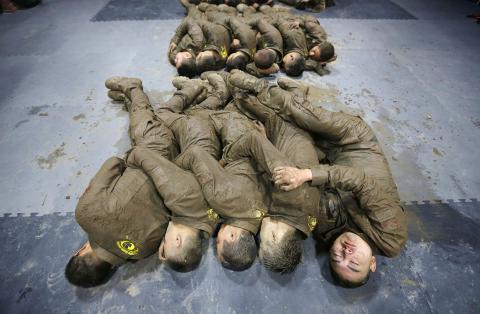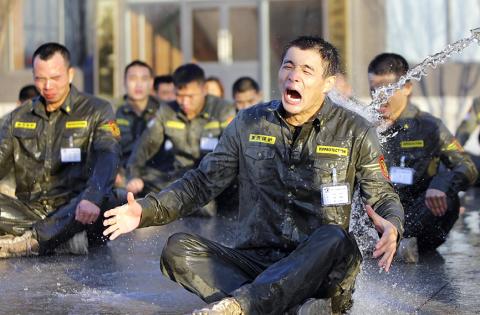Former soldier Chen Yongqing (陳永清) has big ambitions for his bodyguard training school, charging 500,000 yuan (US$82,400) a year for each protector, as China’s rich and famous look to bolster their safety and sense of importance.
Chen’s company, Tianjiao (天驕), which he says is China’s first professional academy for training former soldiers and other indiviudals as bodyguards, is doing so well that he is considering a stock market listing.
“When we started our business, most of our clients were celebrities,” Chen, 30, told reporter. “Most of our clients now are rich entrepreneurs. It’s all related to their business because I think bodyguards are also a status symbol.”

Photo: Reuters
China’s newly wealthy are not generally targeted by criminals and kidnappers — as happens in countries such as Venezuela — but anger is growing about the widening gap between rich and poor.
There have been isolated incidents of people attacking luxury cars involved in accidents with less well-off citizens.
Tianjiao has hired trainers from Israel and Russia, and is looking to recruit from France and Britain as well, Chen said, although the company also works closely with the Chinese military.

Photo: Reuters
“We provide a better platform for retired soldiers, of whom there are thousands every year, so they can get a better job. It would be a waste of talent if these soldiers work as security guards for 2,000 yuan a month,” he said.
“Also if they commit crimes and do bad things, it would be a terrible thing for society, but getting high-end training with us and getting a job as a bodyguard is much better, so the [Chinese People’s Liberation] Army is very grateful for this kind of arrangement we offer,” Chen added.
His clients certainly seem happy with the bodyguards his company trains.
One businessman, who asked to be identified only by his family name, Zhang (張), said he approached Chen after a friend was kidnapped and killed. Zhang now employs 18 bodyguards hired from Tianjiao.
“Apart from the security in my company, they are also responsible for the safety of my family,” Zhang said. “Society is not stable nowadays.”
Chen expects Tianjiao’s annual revenues to hit 100 million yuan within the next five years.
“We are planning to collaborate with investors and venture capital firms for a company listing,” he said.

CAUTIOUS RECOVERY: While the manufacturing sector returned to growth amid the US-China trade truce, firms remain wary as uncertainty clouds the outlook, the CIER said The local manufacturing sector returned to expansion last month, as the official purchasing managers’ index (PMI) rose 2.1 points to 51.0, driven by a temporary easing in US-China trade tensions, the Chung-Hua Institution for Economic Research (CIER, 中華經濟研究院) said yesterday. The PMI gauges the health of the manufacturing industry, with readings above 50 indicating expansion and those below 50 signaling contraction. “Firms are not as pessimistic as they were in April, but they remain far from optimistic,” CIER president Lien Hsien-ming (連賢明) said at a news conference. The full impact of US tariff decisions is unlikely to become clear until later this month

Popular vape brands such as Geek Bar might get more expensive in the US — if you can find them at all. Shipments of vapes from China to the US ground to a near halt last month from a year ago, official data showed, hit by US President Donald Trump’s tariffs and a crackdown on unauthorized e-cigarettes in the world’s biggest market for smoking alternatives. That includes Geek Bar, a brand of flavored vapes that is not authorized to sell in the US, but which had been widely available due to porous import controls. One retailer, who asked not to be named, because

CHIP DUTIES: TSMC said it voiced its concerns to Washington about tariffs, telling the US commerce department that it wants ‘fair treatment’ to protect its competitiveness Taiwan Semiconductor Manufacturing Co (TSMC, 台積電) yesterday reiterated robust business prospects for this year as strong artificial intelligence (AI) chip demand from Nvidia Corp and other customers would absorb the impacts of US tariffs. “The impact of tariffs would be indirect, as the custom tax is the importers’ responsibility, not the exporters,” TSMC chairman and chief executive officer C.C. Wei (魏哲家) said at the chipmaker’s annual shareholders’ meeting in Hsinchu City. TSMC’s business could be affected if people become reluctant to buy electronics due to inflated prices, Wei said. In addition, the chipmaker has voiced its concern to the US Department of Commerce

STILL LOADED: Last year’s richest person, Quanta Computer Inc chairman Barry Lam, dropped to second place despite an 8 percent increase in his wealth to US$12.6 billion Staff writer, with CNA Daniel Tsai (蔡明忠) and Richard Tsai (蔡明興), the brothers who run Fubon Group (富邦集團), topped the Forbes list of Taiwan’s 50 richest people this year, released on Wednesday in New York. The magazine said that a stronger New Taiwan dollar pushed the combined wealth of Taiwan’s 50 richest people up 13 percent, from US$174 billion to US$197 billion, with 36 of the people on the list seeing their wealth increase. That came as Taiwan’s economy grew 4.6 percent last year, its fastest pace in three years, driven by the strong performance of the semiconductor industry, the magazine said. The Tsai